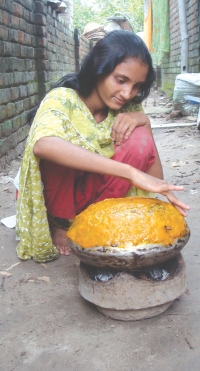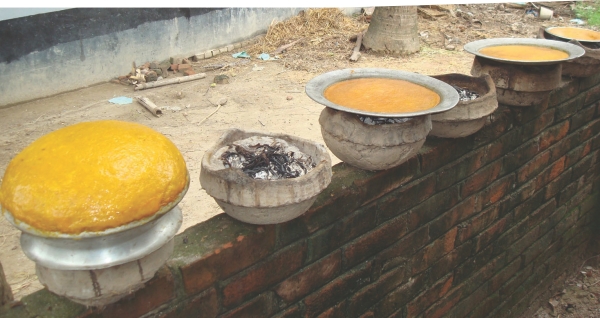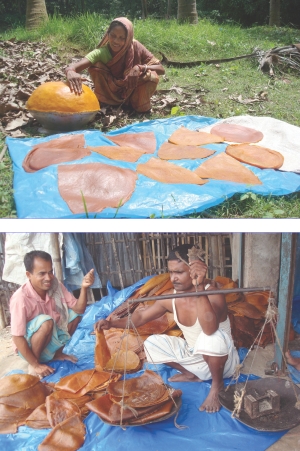BEHIND THE SCENE
Chapainawabganj
Pulp Profit
Chapainawabganj is considered the capital of Mango in Bangladesh. The villages and the upazillas of the district is not only growing and selling the fruit, but also producing delicacies like amshotto, which brings extra cash for poor families in the area.
.................................................................................................
Rabiul Hasan
 Farida Akhtar of Gopalnagar village in Shibgonj upazila of Chapainawabganj makes dried mango pulp, locally known as amshotto in her leisure time after finishing house work for some additional income for her family. Like Farida Akhtar, several hundred women including school and college-going girls of different unions of Shibgonj upazila make amshotto for additional income for their families. Farida Akhtar of Gopalnagar village in Shibgonj upazila of Chapainawabganj makes dried mango pulp, locally known as amshotto in her leisure time after finishing house work for some additional income for her family. Like Farida Akhtar, several hundred women including school and college-going girls of different unions of Shibgonj upazila make amshotto for additional income for their families.
The process of making amshatto requires little skill and technique, and is therefore practiced in large scale, particularly in Dipukuria, Shahbazpur, Mobarakpur, Kansat unions and Shibgonj municipal area of Shibgonj upazila in the district.
Mango is vital to the economy of the upazila as most families earn much needed additional income from selling these unique products of nature. Many families of the upazila, mainly the poor and middle class rural women and girls are engaged in the business of preparing and selling amshotto- pickle made out of the mango pulp.
Chirata Bala Das of Bagtipara in Kansat union said that inhabitants of Bagdipara village, locally known as fishermen village, are poor. Women of the village are engaged preparing and selling amshotto to earn some extra buck for their families. She sold amshotto worth TK 3,000 in this season. Priyanka Das of the same area said, “I prepare amshotto after my school. – not only me, all ages women are engaged in this business”.
They are selling amshotto at TK 60 to 80 per kg. Amshotto is considered a delicacy in Bangladesh. Chapainawabganj, the mango capital in country, grows a lot of varieties of mangoes, and its people are known for their mastery in the art of delicacies like amshotto. “There are varieties of amshotto, ranging from this paper to fleshy, mushy cake, sweeter and tangier varieties – all available in Kansat market” explains Nurunnesa, a housewife of Jalmachhmari Moholla in Shibgonj municipal area, who prepares and sells amshotto.

Department of Agriculture Extension (DAE), Chapainawabganj office said, 1.5 lakh tones of mangoes are expected from 18 lakhs mango trees on 23,070 hectares of land in district.
Amena of Gopalnagar village along with other women said, they pick up ripen mangoes from orchard or buy from markets. Then, they peel the mangoes to extract the pulp, cut them into small pieces and make a paste. Traditionally, the pulp is squeezed out from the peeled mangoes by hand by squashing the whole mango slowly. They use clean cloth to strain the pulp, spread the pulp evenly on it, and dry it on a burner and partly by sunlight. Gradually, the pulp starts to solidify. After 10 to 20 minutes, they remove the platter, retaining the original flavour and the tangy sweetness.
 They said that it provides for many poor women – they pick up mangoes from orchard and prepare amshotto. Later, they sell them to hawkers. Hawkers collect amshotto from door to door and sell them at Kansat amshotto arats (wholesale store). Tohrul Islam and Kazal Ahmed of Chama Bhandar village under Shyampur union said that they collect amshotto from different houses and take these Kansat arats. There are 20 amshotto arats, some 30 kilometres away from the district town. They said that it provides for many poor women – they pick up mangoes from orchard and prepare amshotto. Later, they sell them to hawkers. Hawkers collect amshotto from door to door and sell them at Kansat amshotto arats (wholesale store). Tohrul Islam and Kazal Ahmed of Chama Bhandar village under Shyampur union said that they collect amshotto from different houses and take these Kansat arats. There are 20 amshotto arats, some 30 kilometres away from the district town.
Then aratdar (wholesaler) packs them and distribute to different destinations, including to Dhaka. Every day, two-three trucks loaded with amshotto leave Kansat, the biggest amshotto market in the district, for Dhaka and other parts of the country, traders said.
Mohammad Liton, Bogdadia Arat of Shaym Bazar in Dhaka said, he has been coming to Kansat for the last ten years, and buys amshotto around 7-8 maunds (units of mass) in a day – amshotto here are the best in colour and taste. Demands for amshotto and his investment in this unique product are increasing.
Anarul Islam, another local businessman of Knasat said, “I have been engaged in this business for the last ten years, in every mango season I buy amshotto from hawkers and sell it in Dhaka, Sylhet, Chittagong and other parts of the country. Though the business is seasonal, I make handsome profit in every season.
The women involved in the business are generating financial benefits for their families through amshotto. It should be an immediate concern of the government to provide patronage for of these poor families, as well as improving the quality of this loved delicacy, said Mohibullah, president of Kansat Aam Babaysaee Samity.
Copyright
(R) thedailystar.net 2012 |

 F
F
 They said that it provides for many poor women – they pick up mangoes from orchard and prepare amshotto. Later, they sell them to hawkers. Hawkers collect amshotto from door to door and sell them at Kansat amshotto arats (wholesale store). Tohrul Islam and Kazal Ahmed of Chama Bhandar village under Shyampur union said that they collect amshotto from different houses and take these Kansat arats. There are 20 amshotto arats, some 30 kilometres away from the district town.
They said that it provides for many poor women – they pick up mangoes from orchard and prepare amshotto. Later, they sell them to hawkers. Hawkers collect amshotto from door to door and sell them at Kansat amshotto arats (wholesale store). Tohrul Islam and Kazal Ahmed of Chama Bhandar village under Shyampur union said that they collect amshotto from different houses and take these Kansat arats. There are 20 amshotto arats, some 30 kilometres away from the district town.